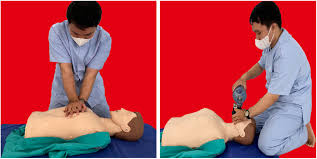Performing CPR is an essential emergency first aid skill that everyone should know. It can be the difference between life and death, particularly when administered within the critical first six minutes of an incident.
Cardiopulmonary resuscitation (CPR) is a procedure designed to maintain blood and oxygen flow in individuals whose heart and breathing have ceased. Being equipped with the knowledge of CPR is crucial as emergencies can arise unexpectedly, and your ability to perform CPR could mean saving a life.
Whether you’re in a restaurant, on the football field, or aboard an airplane, knowing how to perform CPR can prove invaluable. It’s especially vital during incidents such as heart attacks, strokes, or near-drowning situations.
Here’s a step-by-step guide on how to perform CPR on individuals aged 12 years and above:
1. Ensure the environment is safe, free from smoke, fumes, or harmful odors.
2. Attempt to arouse the person by gently tapping them and assessing their response.
3. Send someone to call for medical assistance or an ambulance.
4. Lay the person flat on the floor.
5. Check for signs of breathing or life. Watch their chest and assess for any movement or breathing. This should be done for approximately 10 seconds before initiating CPR.
6. Place one palm at the center of the adult’s chest and the other on top.
7. Interlock your palms and straighten your arms. Compress the adult’s chest to a depth of about 2 inches, repeating this motion 30 times.
8. After 30 compressions, provide two breaths.
9. Tilt the person’s head back, lift their chin, close their nose, and provide two slow, gentle breaths into their mouth.
10. Continue alternating between chest compressions and breaths until medical help arrives.
By familiarizing yourself with these CPR procedures, you can play a vital role in saving lives during emergencies. Remember, acting swiftly and confidently can make all the difference in critical situations.




